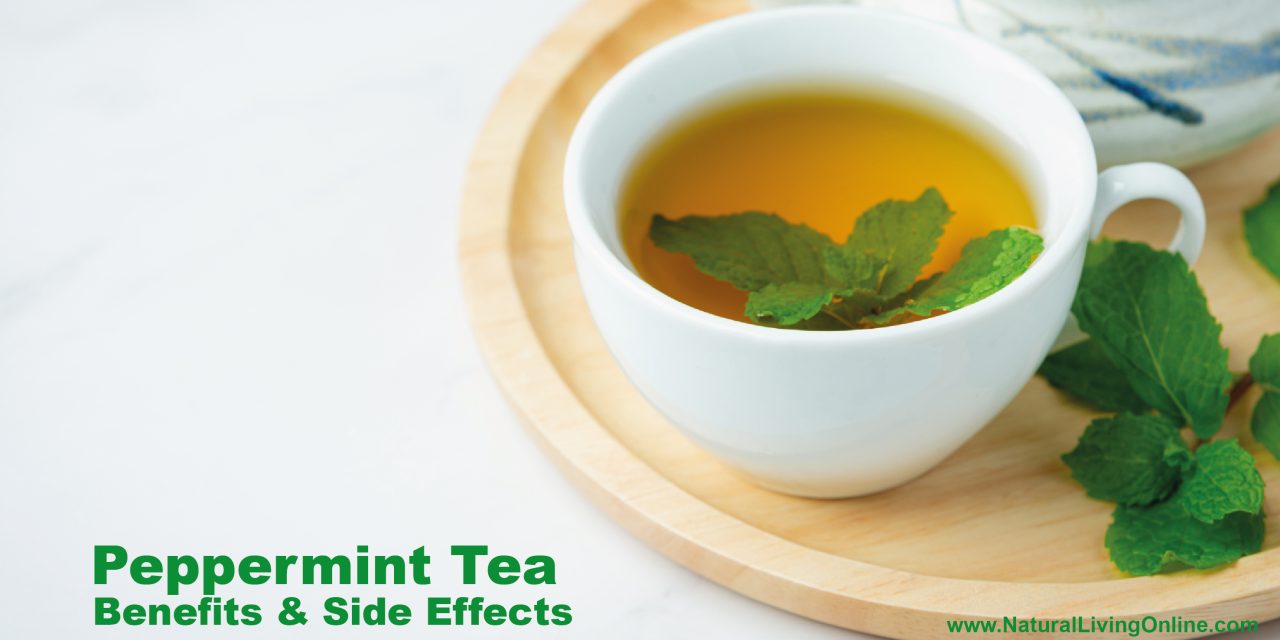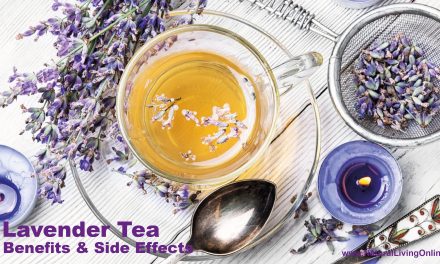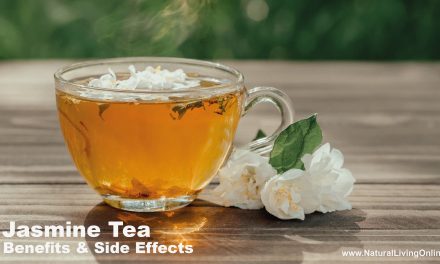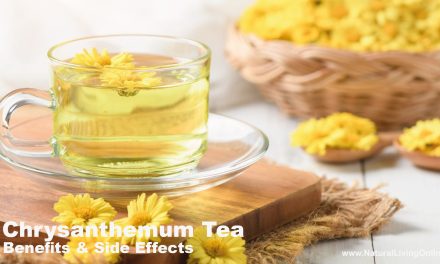Peppermint tea is a popular herbal drink known for its refreshing taste and medicinal properties. It can improve digestion, relieve headaches, and freshen breath. Made from the leaves of the Mentha Piperita plant, this caffeine-free beverage has been praised by nutritionists and doctors alike.
Many have turned to peppermint tea for its natural healing abilities. It boasts antibacterial, anti-inflammatory, and digestive benefits, making it a valuable addition to daily routines. Beyond its health advantages, peppermint tea is easy to prepare at home, and its pleasant aroma can be a comforting presence in any kitchen.
Exploring the myriad benefits of peppermint tea is a journey into both science and tradition. From aiding sleep to reducing stress levels, this herbal remedy’s versatility highlights its potential for those seeking natural health solutions.
Key Takeaways
- Peppermint tea can aid digestion and relieve headaches.
- Made from Mentha Piperita, it offers antibacterial and anti-inflammatory benefits.
- Easy to brew at home, it provides a variety of health advantages.
Composition and Properties
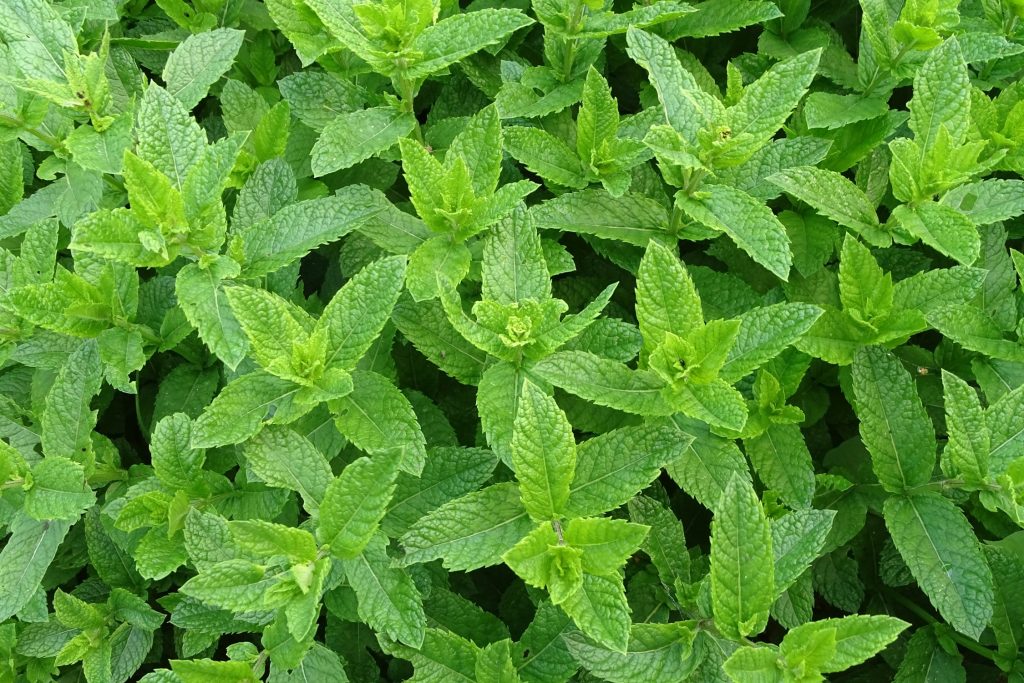
Peppermint tea contains several key compounds that contribute to its health benefits, including essential oils like menthol, which provide its distinctive flavor and aroma. It also boasts a strong antioxidant capacity which helps in protecting the body from damage by free radicals.
Vital Compounds in Peppermint
Peppermint is rich in essential oils, particularly menthol, menthone, and limonene. These oils give peppermint tea its refreshing taste and cooling effect. The leaves also contain flavonoids, which are plant compounds with anti-inflammatory properties.
These vital compounds work together to provide various health benefits. For example, menthol acts as a natural muscle relaxant, which can help in easing headaches and digestive issues.
Antioxidant Capacity
Peppermint tea is known for its significant antioxidant capacity. Antioxidants are crucial in neutralizing free radicals that can damage cells and tissues. The primary antioxidants found in peppermint tea include rosmarinic acid, flavonoids, and vitamins A and C.
These compounds help reduce oxidative stress in the body. By doing so, they can lower the risk of chronic diseases like heart disease and cancer. Regular consumption of peppermint tea may enhance the body’s ability to fight off infections and maintain overall health.
Menthol: The Active Agent
Menthol is the main active agent in peppermint tea and is responsible for most of its medicinal properties. It gives peppermint its cooling sensation and is effective in soothing the digestive tract. Menthol’s antispasmodic properties help relax the muscles in the intestines, making it useful for relieving symptoms of irritable bowel syndrome (IBS).
Beyond digestion, menthol has anti-inflammatory properties that can help alleviate symptoms of colds and headaches. It works by opening the airways and reducing congestion, providing relief from respiratory issues. This makes peppermint tea a go-to remedy for many common ailments.
Understanding these components and properties can help you better appreciate the benefits that peppermint tea offers.
Health Benefits and Uses
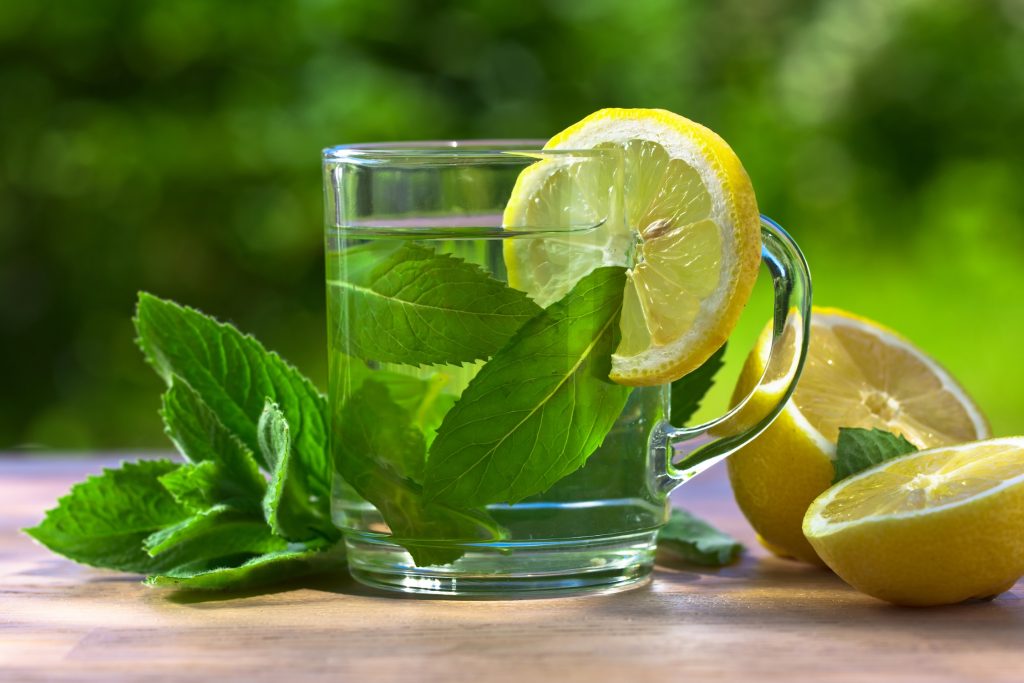
Peppermint tea offers various health benefits that can aid in digestion, respiratory relief, and pain management. It contains compounds like menthol, which provide soothing effects and various medicinal properties.
Digestive Health
Peppermint tea is well known for its benefits to digestive health. It helps alleviate symptoms of indigestion, bloating, and nausea. The tea relaxes the muscles of the digestive tract, promoting smoother digestion.
Individuals with Irritable Bowel Syndrome (IBS) might find relief through peppermint tea, as it can reduce abdominal pain and discomfort. The antibacterial properties of peppermint may also help manage the balance of gut bacteria, reducing complications from bacterial overgrowth.
While some people might find relief from GERD and acid reflux, others might experience increased symptom severity, so those with these conditions should consume it with caution.
Respiratory Relief
Menthol, a key component of peppermint tea, is helpful in clearing nasal congestion. Drinking peppermint tea can reduce symptoms of cold and flu, providing a soothing effect on sore throats.
The tea acts as a natural decongestant, breaking down mucus and making it easier to breathe. People suffering from conditions like asthma or chronic respiratory issues might benefit from its ability to clear airways and reduce respiratory irritation.
Peppermint tea can also assist in relieving symptoms of seasonal allergies and sinus infections, making it a versatile tool for respiratory health.
Pain Management and Headaches
Peppermint tea is effective in managing various types of pain, including migraines and tension headaches. The menthol in the tea acts as a natural muscle relaxer, easing muscle tension and reducing headache symptoms.
The tea’s anti-inflammatory properties help to reduce inflammation in the body, which can contribute to headache relief. Drinking peppermint tea may also help alleviate symptoms of menstrual cramps due to its soothing and muscle-relaxing effects.
While peppermint tea is beneficial for pain relief, it should be consumed in moderation as excessive intake can lead to potential side effects such as nausea. The safe and moderate use offers optimal benefits.
Nutritional Information and Potential Risks
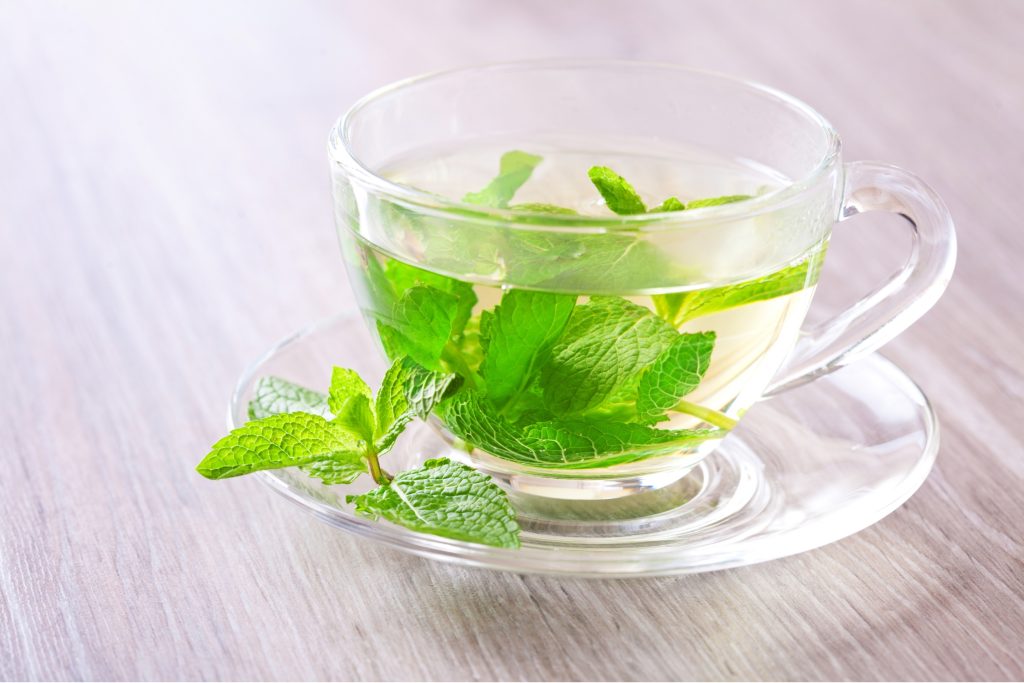
Peppermint tea offers several benefits, including being caffeine-free, which can be helpful for people sensitive to caffeine. While generally safe, it’s important to be aware of potential allergic reactions and side effects.
Caffeine Content and Effects
Peppermint tea is naturally caffeine-free, which makes it a good choice for those who want to avoid caffeine intake. This can be particularly appealing to individuals who are sensitive to caffeine or those who want to enjoy a warm, relaxing beverage without the stimulating effects associated with teas like black or green tea.
Since it doesn’t contain caffeine, you can consume peppermint tea at any time of day without worrying about disrupting sleep patterns. It’s also a good option for children and pregnant women, though you should consult a healthcare provider. Drinking peppermint tea in moderation is generally safe, but excessive consumption can lead to gastrointestinal discomfort.
Allergies and Adverse Reactions
While peppermint tea is safe for most people, allergic reactions can occur in some individuals. Symptoms of an allergic reaction may include itching, hives, and swelling, primarily affecting the face, lips, or tongue. Anyone experiencing these symptoms should discontinue use and seek medical advice.
Additionally, some people might experience side effects such as heartburn or a burning sensation in the stomach. This is because peppermint can relax the lower esophageal sphincter, potentially causing acid reflux. People with gastroesophageal reflux disease (GERD) or hiatal hernia should be cautious and consult their doctor before consuming peppermint tea.
Brewing Techniques and Consumption Tips
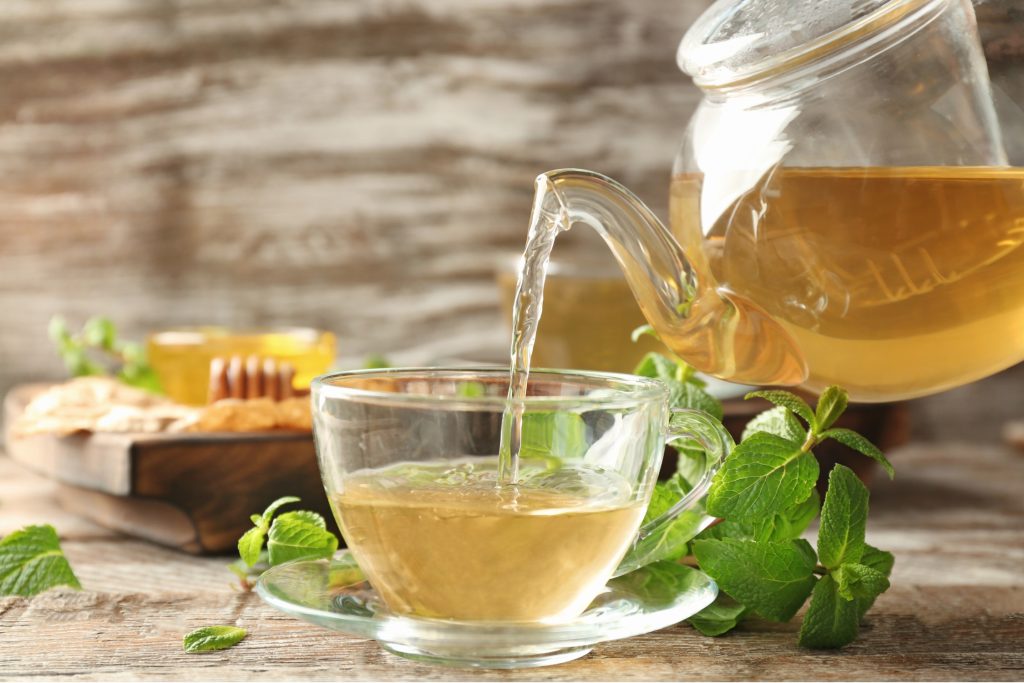
Preparing a proper cup of peppermint tea involves the right balance of ingredients and methods. This ensures you get the most out of its flavor and health benefits. Here, we cover how to brew peppermint tea perfectly and suggest ways to include it in your daily life.
Optimal Preparation for Maximum Benefits
To brew peppermint tea, start with high-quality peppermint leaves. You can use either fresh or dried leaves. For dried leaves, use one teaspoon per 8 ounces of water, or one tea bag. If using fresh leaves, a tablespoon per cup is ideal.
Boil water and pour it over the leaves in a teapot or directly into your mug. Steep for 5 to 7 minutes. For a more intense flavor, lightly muddle the leaves before adding water. Avoid steeping for too long, as this can make the tea bitter.
For an extra boost, some people like to add a few drops of peppermint essential oil. This can enhance the aroma and potential benefits of the tea.
Incorporating into Daily Routine
Incorporating peppermint tea into your daily routine is simple and rewarding. Start your day with a warm cup to help invigorate your senses. It can be a refreshing change from coffee or black tea.
Peppermint tea is also an excellent choice for an afternoon pick-me-up. Its light, crisp flavor can be a great way to refresh yourself without the need for caffeine.
For those who enjoy herbal teas, substituting watermint or other herbal teas with peppermint can provide variety while maintaining the soothing benefits of herbal infusions.
In the evening, peppermint tea can help with relaxation and ease digestion after meals. Consider drinking it right after dinner to support your digestive system and prepare for a restful night.
Cultural and Historical Significance
Peppermint tea has a long history intertwined with traditional medicine and global trade. Its cultural impact spans across numerous civilizations, highlighting its enduring appeal and importance.
Peppermint in Traditional Medicine
Peppermint, known scientifically as Mentha Piperita, has been used for centuries in traditional medicine. Ancient Egyptians valued it for its digestive properties, often brewing it to soothe stomach ailments.
In Europe, peppermint tea became popular in the Middle Ages. It was used to relieve headaches and other minor ailments. Traditional healers found that the menthol in peppermint helped calm the digestive system.
The soothing effect of the tea made it a common remedy for indigestion and nausea. Today, peppermint tea remains a popular natural remedy, its historical roots reinforcing its continued use.
Global Production and Trade
The trade and production of peppermint have grown significantly over the centuries. While the mint was initially cultivated in Europe, it spread to North America by the 18th century.
The United States, particularly the state of Washington, is now a leading producer. Regions with the right climate for growing mint, like parts of Europe and North America, dominate the market.
Spearmint, closely related to peppermint, is often grown alongside Mentha Piperita. The global trade of these herbs reflects their high demand in both culinary and medicinal contexts.
The rise in peppermint tea’s popularity can be attributed to its refreshing flavor and health benefits. Its presence in the global market highlights its sustained cultural and economic significance.
Frequently Asked Questions
What are the potential benefits of peppermint tea for skin health?
Peppermint tea may help improve skin health due to its anti-inflammatory and cooling properties. These qualities can soothe skin irritations and reduce redness. The antioxidants present in peppermint can also promote clearer skin by fighting free radicals.
Can consuming peppermint tea lead to any side effects?
While peppermint tea is generally safe, some people may experience side effects. These may include heartburn or allergic reactions. Those with gastroesophageal reflux disease (GERD) should consume it cautiously as it can potentially worsen the condition.
How does peppermint tea affect sleep when consumed before bed?
Drinking peppermint tea before bed can promote relaxation and help improve sleep quality. Its muscle relaxant properties reduce stress and tension, making it easier to fall asleep. However, it does not contain caffeine, so it won’t keep you awake.
Does peppermint tea contribute to weight loss efforts?
Peppermint tea may support weight loss efforts by aiding digestion and reducing appetite. It helps in breaking down fats and improving metabolism. Drinking peppermint tea can make you feel fuller, potentially leading to fewer calorie intakes.
Are there any benefits to drinking ginger and peppermint tea together?
Combining ginger and peppermint tea can enhance digestive health. Ginger is known for its anti-nausea and anti-inflammatory properties, while peppermint helps with muscle relaxation and pain relief. Together, they can provide a soothing effect on the stomach.
How often is it safe to consume peppermint tea daily?
Most experts agree that drinking 2-3 cups of peppermint tea daily is safe and beneficial for most people. It’s always a good idea to start with a small amount and observe how your body reacts before increasing the intake.
References:
A review of the bioactivity and potential health benefits of peppermint tea (Mentha piperita L.)
Commercial peppermint (Mentha×piperita L.) teas: Antichlamydial effect and polyphenolic composition
This website does not provide medical advice.
All information provided on this website, and on associated social media networks, including but not limited to texts, images, and numbers are for general information purpose only. It is not intended as medical advice and it does not include all possible precautions, side effects, or interactions that may occur. Neither NaturalLivingOnline.com nor its author/founder take responsibility for how you use this information. Statements contained on NaturalLivingOnline.com have not been evaluated by the FDA. You should conduct thorough research via multiple sources and consult your physician or qualified doctor before using any essential oil or herbal remedy. Information on NaturalLivingOnline.com must not be relied upon for medical, legal, financial or other decisions.

